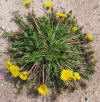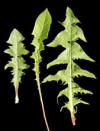WILD
FOODIES' HOME PAGE
PLANT PROFILE LIST
NAME: Dandelion
SPECIES / FAMILY: Taraxacum / Asteraceae or Compositae
OTHER COMMON NAME(S):
CONDITIONS:
sun-partial shade
|
PARTS: |
EDIBLE |
TASTE |
RAW/COOK |
SEASON |
|
All |
|
|
|
|
|
Shoots |
|
|
|
|
|
Leaves |
|
bitter |
RAW/COOK |
Spring-Fall |
|
Buds/Flowers |
|
slightly sweet |
RAW/COOK |
Spring-Fall |
|
Fruits |
|
|
|
|
|
Roots |
|
turnip |
RAW/DRY/BAKE |
Fall best |
|
Seeds |
|
|||
|
Nuts |
|
|
|
|
|
Pods |
|
|
|
|
|
Stalk |
|
|
|
|
|
Bark |
|
|
|
|
PORTION: small to medium
COMMENT: Excellent and abundant leaf and root vegetable. All parts used. Root used as caffeine-free coffee substitute, but also as a veggie. Flowers, eaten raw and used in salads; also used to make wine. Flowers taste sweeter before bees visit. Leaves can be bitter. To remove bitterness, either dry or boil leaves once or twice, removing water between boilings.
CAUTION: A very few people are highly allergic to latex in dandelion leaves by eating and/or touching them.
NUTRITION/MEDICINAL:
From pfaf.org/user/plant.aspx?LatinName=Taraxacum+officinale Aperient; Cholagogue; Depurative; Diuretic; Hepatic; Hypoglycaemic; Laxative; Miscellany; Stomachic; Tonic; Warts. The dandelion is a commonly used herbal remedy. It is especially effective and valuable as a diuretic because it contains high levels of potassium salts and therefore can replace the potassium that is lost from the body when diuretics are used. All parts of the plant, but especially the root, are slightly aperient, cholagogue, depurative, strongly diuretic, hepatic, laxative, stomachic and tonic[. The root is also experimentally cholagogue, hypoglycaemic and a weak antibiotic against yeast infections. The dried root has a weaker action. The roots can be used fresh or dried and should be harvested in the autumn when 2 years old. The leaves are harvested in the spring when the plant is in flower and can be dried for later use. A tea can be made from the leaves or, more commonly, from the roots. The plant is used internally in the treatment of gall bladder and urinary disorders, gallstones, jaundice, cirrhosis, dyspepsia with constipation, oedema associated with high blood pressure and heart weakness, chronic joint and skin complaints, gout, eczema and acne. The plant has an antibacterial action, inhibiting the growth of Staphylococcus aureus, Pneumococci, Meningococci, Bacillus dysenteriae, B. typhi, C. diphtheriae, Proteus etc. The latex contained in the plant sap can be used to remove corns, warts and verrucae. The latex has a specific action on inflammations of the gall bladder and is also believed to remove stones in the liver. A tea made from the leaves is laxative.(1)
LOOK-A-LIKES: Dandelion leaf looks like chicory, is also smoother than chicory http://www.foragingtexas.com/2008/08/chicory.html
Carolina False Dandelion, Carolina desert-chicory https://www.pfaf.org/user/Plant.aspx?LatinName=Pyrrhopappus
POISONOUS LOOK-A-LIKES:
OTHER USES: The flowers are an ingredient of 'QR' herbal compost activator[32]. This is a dried and powdered mixture of several herbs that can be added to a compost heap in order to speed up bacterial activity and thus shorten the time needed to make the compost[K]. A liquid plant feed can be made from the root and leaves[54]. A low quality latex, which can be used for making rubber, can be obtained from the roots of this plant. A magenta-brown dye is obtained from the root[141]. The plant releases ethylene gas, this stunts the growth of nearby plants and causes premature ripening of fruits[14, 18]. A distilled water made from the ligules (thin appendages at the base of the leaf blades) is used cosmetically to clear the skin and is particularly effective in fading freckles[7]. A dynamic accumulator gathering minerals or nutrients from the soil and storing them in a more bioavailable form - used as fertilizer or to improve mulch. (1)
SOURCE LINKS (may include nutritional and medicinal info, plus other uses):
- https://pfaf.org/user/plant.aspx?LatinName=Taraxacum+officinale
- https://www.eattheweeds.com/dandelions-hear-them-roar
- https://en.wikipedia.org/wiki/Taraxacum
- http://www.foragingtexas.com/2008/09/dandelion.html (good photos)
- https://wildfoodgirl.com/2019/best-dandelion-soup-ever
- https://www.abeautifulplate.com/sauteed-dandelion-greens-with-eggs
- https://www.theprairiehomestead.com/2014/04/dandelion-recipes.html
- https://www.almanac.com/content/dandelion-recipes-wonderful-edible-weed


